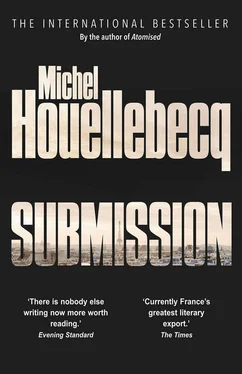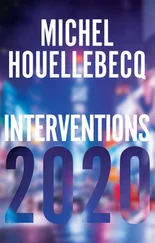At first the brutal implosion of the two-party system, which had ruled French politics since time immemorial, plunged the media into a stupor bordering on aphasia. You could see poor Christophe Barbier trailing from one news set to the next, his scarf at half-mast, seemingly unable to comment on a historic change that he hadn’t seen coming. The truth was nobody had. And yet, as the weeks went by, nodes of opposition began to form — first, on the anti-religious left. Protests were organised by the rather unlikely team of Jean-Luc Melenchon and Michel Onfray. The Left Front still existed, at least on paper, and it was clear that Ben Abbes would face a challenge in 2027, and not just from the National Front. On the other side, groups like the Union of Salafist Students rose up to denounce the persistence of immorality and demand sharia law. So, little by little, the stage was set for a political debate. This would be a new kind of debate, unlike anything in recent French history, more like what existed in the Middle East. But still it would be debate, of a sort. And the existence of political debate, however factitious, is necessary to the smooth functioning of the media — and, perhaps also, to keep people feeling that they live, at least technically, in a democracy.
Beneath these surface agitations, France was undergoing deep and rapid change. It turned out that some of Ben Abbes’s ideas had nothing to do with Islam: during a press conference he declared (to general bafflement) that he was profoundly influenced by distributism. He had actually said so before, several times, on the campaign trail, but since journalists have a natural tendency to ignore what they don’t understand, no one had paid attention and he’d let it drop. Now that he was a sitting president, the reporters were forced to do their homework. So, over the next few weeks, the public learned that distributism was an English economic theory espoused at the turn of the last century by G. K. Chesterton and Hilaire Belloc. It was meant as a ‘third way’, neither capitalism nor communism — a sort of state capitalism, if you like. Its central idea was to do away with the separation between capital and labour. For distributists, the basic economic unit was the family business; when in certain sectors consolidation became necessary, the government had to ensure that the workers remained the owners and managers of their own enterprise.
Distributism, Ben Abbes later explained, was perfectly compatible with the teachings of Islam. This was not self-evident, since Chesterton and Belloc were known during their lifetimes as outspoken Catholic polemicists. It soon became clear that although their doctrine was avowedly anti-capitalist, Brussels wouldn’t have much to worry about. The main practical measures adopted by the new government were, on the one hand, to end state subsidies for big business — which Brussels had always fought in the name of free trade — and, on the other, to adopt policies that favoured craftsmen and small business owners. These measures were an instant hit: for decades, every young professional in the country had dreamed of starting his own business, or at least of becoming his own boss. The measures also reflected changes in the national economy: despite the costly efforts to save heavy industry in France, factories continued to close, one after the other, so farmers and craftsmen managed to compete and even, as they say, to grow their market share.
These developments were turning France into a new kind of society, but it took a young sociologist, Daniel Da Silva, to articulate the change. His groundbreaking essay was ironically entitled ‘One Day, Son, All This Will Be Yours’. The subtitle was more straightforward: ‘Towards a Reason-Based Family’. In the introduction, Da Silva expressed his debt to an essay by the philosopher Pascal Bruckner, published a decade earlier, in which Bruckner had argued that marriage for love was a failure; he called for a return to marriage based on reason. Da Silva maintained that family ties, especially the tie between father and son, cannot be based on love, only on the transmission of practical knowledge and on inheritance. The transition to a salaried workforce had doomed the nuclear family and led to the complete atomisation of society, and that society could only be rebuilt if industry was based on a small-business model. In the past, arguments against romance may have enjoyed a succès de scandale , but before Da Silva the media never took them seriously, thanks to the universal consensus concerning individual liberty, the mystery of love, and so on. Da Silva was quick on his feet, an excellent debater, and basically indifferent to political or religious ideology. By sticking to his area of expertise — the evolution of family structures and their effects on the birth rate in Western societies — he kept from being swallowed up by his right-wing admirers, and instead became a leader in the debates that had begun to form (albeit very slowly, very gradually, without great animus, in a general atmosphere of tacit and lazy acceptance) around the domestic policies of Mohammed Ben Abbes.
My own family history was a perfect illustration of Da Silva’s arguments. As for love, it had never seemed more remote. The miracle of my first visit to Rachida and Luisa had failed to produce a sequel, and once more my cock had become an organ as efficient as it was unfeeling. I left their studio in a state of near despair, knowing that I would probably never see them again, and that my viable options were slipping ever more quickly through my fingers, leaving me, as Huysmans would have put it, ‘unmoved and dry’.
Not long after, a cold front several thousand kilometres long approached Western Europe. After stagnating for a few days over the British Isles, the polar air mass swept across France overnight, bringing unseasonably low temperatures.
My body, no longer a source of pleasure, retained its capacity for suffering, and within a few days I realised that, for maybe the tenth time in three years, I’d fallen victim to dyshidrosis. Tiny pustules spread across the soles of my feet and between my toes, merging to form one oozing, raw mass. At the dermatologist’s office I was told that the rash had been aggravated by an opportunistic fungal infection. It was treatable, but the treatment took a long time, and I shouldn’t expect to see any improvement for several weeks. In the meantime, I woke up every night in pain. I had to scratch for hours, until I bled, to get any relief. I couldn’t believe that my toes, those plump, absurd little pieces of flesh, could be ravaged by such piercing torments.
One night, after one of these orgies of scratching, I got up and walked, bleeding, to the bay window. It was three in the morning, but as always in Paris, the sky wasn’t completely dark. From my window I could see ten high-rises, a few hundred medium-sized buildings. A few thousand apartments in all, a few thousand households — which by now tended to mean two people or, more and more often, just one. Most of the cells were dark. I had no more reason to kill myself than most of these people did. On reflection, maybe even less. My life was marked by real intellectual achievements. In a certain milieu — granted, a very small one — I was known and even respected. Financially, I had nothing to complain about. Until I died I was guaranteed a generous income, twice the national average, without having to do any work. And yet I knew I was close to suicide, not out of despair or even any special sadness, simply from the degradation of ‘the set of functions that resist death’, in Bichat’s formulation. The mere will to live was clearly no match for the pains and aggravations that punctuate the life of the average Western man. I was incapable of living for myself, and who else did I have to live for? Humanity didn’t interest me — it disgusted me, actually. I didn’t think of human beings as my brothers, especially not when I looked at some particular subset of human beings, such as the French, or my former colleagues. And yet, in an unpleasant way, I couldn’t help seeing that these human beings were just like me, and it was this very resemblance that made me avoid them. I should have found a woman to marry. That was the classic, time-honoured solution. A woman is human, obviously, but she represents a slightly different kind of humanity. She gives life a certain perfume of exoticism. Huysmans would have posed the problem in almost exactly the same terms. Not much had changed since then, except in an incidental and negative way, through slow erosion and levelling — but no doubt even this levelling, these changes, had been greatly exaggerated. In the end Huysmans had taken another path, he had chosen the more radical exoticism of religion ; but that path still left me just as perplexed as the other.
Читать дальше







